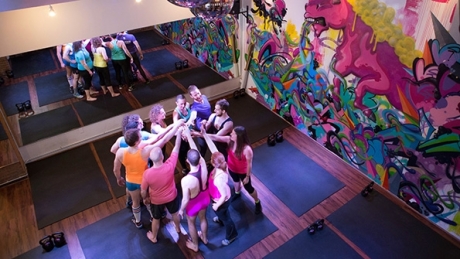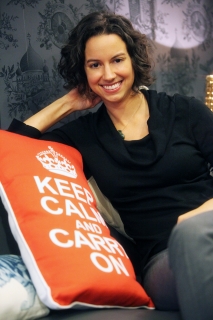 Mark Fisher is the founder of one of the most notorious fitness studios in the nation. Having gone from a self-proclaimed workout nerd acting in regional theater gigs to becoming the biggest Broadway-body rebuilder out there, Mark Fisher Fitness is anything but a regular gym. Combining performance art and weight training, Mark Fisher has found a niche for even the biggest workout-phobe because MFF is anything but a gym—it’s a clubhouse short for ‘The Enchanted Ninja Clubhouse of Glory and Dreams.’ Walls are laden with graffitied images of rainbows and unicorns, trainers wear tutus and sequins, and the results are staggering, having transformed some of the top Broadway bodies out there. Today on ‘Dot Complicated with Randi Zuckerberg’ Mark Fisher sat down to discuss how his own inner ninja disrupted the fitness industry.
Mark Fisher is the founder of one of the most notorious fitness studios in the nation. Having gone from a self-proclaimed workout nerd acting in regional theater gigs to becoming the biggest Broadway-body rebuilder out there, Mark Fisher Fitness is anything but a regular gym. Combining performance art and weight training, Mark Fisher has found a niche for even the biggest workout-phobe because MFF is anything but a gym—it’s a clubhouse short for ‘The Enchanted Ninja Clubhouse of Glory and Dreams.’ Walls are laden with graffitied images of rainbows and unicorns, trainers wear tutus and sequins, and the results are staggering, having transformed some of the top Broadway bodies out there. Today on ‘Dot Complicated with Randi Zuckerberg’ Mark Fisher sat down to discuss how his own inner ninja disrupted the fitness industry.
“My journey into fitness was unconventional. When I was little I tried to play sports but was unsuccessful so I found theater.”
“I stumbled into community through theater.”
“When I’m into something I am into it.”
“In my early 20s I was a young struggling actor. Girls were intimidating. But the gym was the one thing I could count on.”
“I can’t help but share my passion for other people. I became known as the guy at the gym who would help train other people.”
“I had this identity about myself as an actor but I found myself falling in love with my mistress, the gym.”
“I had this weird thing about business. I didn’t want to be the man.”
“In August on 2010 I would read two books a week—one training book and one business book. It healed my trepidation about business.”
“Business is a creative art process you do with other people.”
“We got lucky that we thought of culture first. From Day 1 we had a lot of clarity around our vision and mission.”
“How do we balance who we are authentically and reach outside of ourselves to the community needs as well?”
“The culture is created by the Ninjas and the community.”
“What are you passionate about and what do the people you’re looking to serve need?”
“The people I want to talk to were the people who weren’t being served by the fitness industry.”
“Our tagline is ‘Ridiculous Humans, Serious Fitness.’”
“When I teach I call everyone ‘Ninja’ so people started signing their emails Ninja Steve or Ninja Mary.”
“We’ve said a lot of things over the years and a lot of them are funny for a moment but when something captures the Ninja’s imagination we take notice.”
“A lot of trainers are found all over. They’re drag queens or pre-med students studying clowning.”
“Calling your clients a ‘thing’ isn’t something you want to do unless it’s authentic.”
“I know part of creating sustainable fitness strategies is rewriting our narrative as it goes along.”
“I don’t think you can ever listen to what your customers want enough.”
“There’s something to be said about following your heart and what you want, but the customer service piece is so important to us.”
“Whenever we hear something that the Ninjas like or don’t like we shoot out an email to the entire team to have those conversations.”
“Several times a month I have 15 minutes to talk to the Ninjas to hear their feedback.”
“We make sure we communicate what’s going on with Ninja feedback.”
“When Mark Fisher became Mark Fisher Fitness it had a much longer name about what I was going to do as a one-man band.”
“I like to feel like I’m doing business with a person not a business.”
“Go to markfisherhumanbeing.com to see everything we’re working on.”
“MyBroadwaybody.com is for those not located in NYC.”
“The classic reason we see people fail at their fitness goals. It’s hard to change everything all at once. Slight mistakes can make people quit.”
“The best approach is to pick habits that you have a 90% you can do easily like eating one piece of broccoli everyday. Layers turn to habits.”
“Willpower is like a muscle. It becomes part of your narrative you train on daily muscle.”
Five years ago Alex Tryon combined her love of art and Southern hospitality to visual artists, founding and leading Artsicle—a Netflix-style rental house for fine art. But after years of speculation that Artsicle was flourishing and high praise from the press, the profits weren’t mirroring the assumptions and Alex and her co-founder had to shutter Artsicle’s doors. Here’s her story as told on ‘Dot Complicated with Randi Zuckerberg’:
“We founded Artsicle 5 years ago as a side project. I wasn’t happy in my day job and had dreams of working for myself.”
“We pivoted a full three or four times.”
“The idea strikes so clearly we had a lot of false positives at the start. We were getting a ton of sign ups and a ton of traffic but no orders.”
“It was hard to tell what was missing when people were praising the work and encouraging the business.”
“We got to profitability. A profitable company will never die even when you’re squeaking by, and we were squeaking by.”
“One of the things we learned was dollars are most stronger votes than words. We would’ve dropped pricing had we listened to data.”
“We heard our users wanted to search by color. It sounded brilliant. We built it then our conversion rate plummeted. It didn’t lead people to engage with art.”
“I would spend a lot more time talking to my customers before we built anything. It’s hard to change as fast and drastically as you want when everything is built.”
“It’s hard to invent a market. We thought we were closing a gap but we were bringing art to people who didn’t see it in their lives.”
“We aimed for the gap and tried to pull people to us.”
“We took 18 months to shut down Artsicle. We didn’t want to declare bankruptcy.”
“To this day I hate introducing myself. I’m the former founder of Artsicle and don’t have the energy to explain.”
“First time entrepreneurs to tie themselves to their identity of their business. As you grow you have many more touch points to relate to.”
“It was mind blowing to me about how little writing there was toward shuttering a business.”
“Two lawyers gave me advice that was straight up illegal and others told me just to shut down.”
“We’ve been surrounded by talking about our successes. When it was time to talk about our failure, it was our choice to do so.”
“When you know you’re way out it’s easier to run, but it’s also easier to stay.”
“I know personally that I had a higher level of accountability to my customers than my male peers did.”
Tune into ‘Dot Complicated with Randi Zuckerberg’ every Wednesday at 12pm ET/9am PT only on SiriusXM Business Channel 111












